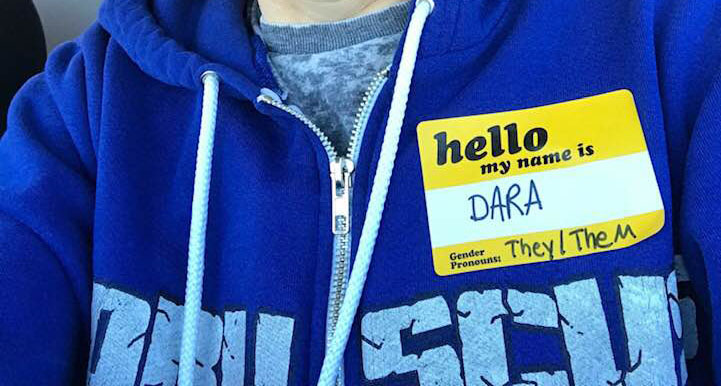
“Using ‘they/them’ as a pronoun is too hard.”
This is one of the most frequent statements I’ve heard over the last couple of years – both in my personal life as someone who uses they/them pronouns, and in my professional life as a trans/nonbinary-awareness trainer.
If you’ve ever thought or said this before, please read this article:
‘They’ is Here to Stay: Get Over It
In early 2018 I knew I was nonbinary, but was still using she/her pronouns, even though I was growing increasingly uncomfortable with their use. Why?
Because I was incredibly resistant to switching to they/them.
I knew asking everyone to use they/them pronouns for me would bring a new level of discomfort to my life. Having to explain it to people, to have to decide if and when I should correct someone who used she/her (especially if they’ve known me for years with those pronouns). Having to take on the emotional labor for others when they say, “This is hard, it doesn’t come naturally to me.”
But my discomfort with she/her outweighs all of this.
To be clear, I absolutely understand it takes time to adjust to using “singular they.” I myself continue to practice it on a regular basis.
What’s exhausting is when I hear how hard it is for others. I KNOW. I feel a strong sense of “blah” every time I hear it. The voice in my head goes: “I’m such a pain, I’m so annoying, I’m asking for too much.”
I know folks don’t mean for that to happen when they say it’s too much. But to me, it still goes to a place of feeling like I’M too much.
The key is to practice. If you know someone who uses they/them pronouns, use them consistently whether you are talking to them, about them, writing about them, or even thinking about them.
You can also use they/them pronouns for anyone who’s pronouns you don’t know. It turns out you don’t know a LOT of people’s pronouns. Because unless they tell you, you don’t know what they are. Your restaurant server, your barista, the person sitting next to you on the bus, the person who delivers your mail. Practice EVERY DAY using they/them pronouns with the people you encounter until you have confirmation of which ones they use.
Once again, I really do appreciate you reading this and taking the time to think on it ![]()




Glenn
March 29, 2020 at 2:13 PMThank you for posting this as this is something with which I am currently struggling. More and more using they/them feels right to me but I definitely present as male with my shaved head, goatee, and fairly worked-out form. So naturally people are going to look at me and assume he/him. I suppose I haven’t gotten to the point of, “I don’t care what your eyes tell you, my pronouns are they/them and I ask you respect that.” Reading stories like this, especially from others who are older like myself, is very helpful.
Hillary
November 8, 2021 at 7:42 PMDo you know a good resource for using they/them correctly in different grammar situations? For example, would I say, “How are you doing today?” when talking directly to the person? My husband thinks it would be “How are they doing today?” A resource sheet would be so great to have. I have looked a bit, but haven’t found anything stellar on this yet. Thank you!
Dara Hoffman-Fox
November 10, 2021 at 11:36 AMWebsites like this are super useful! 🙂
https://www.practicewithpronouns.com/#/?_k=q0x9ye